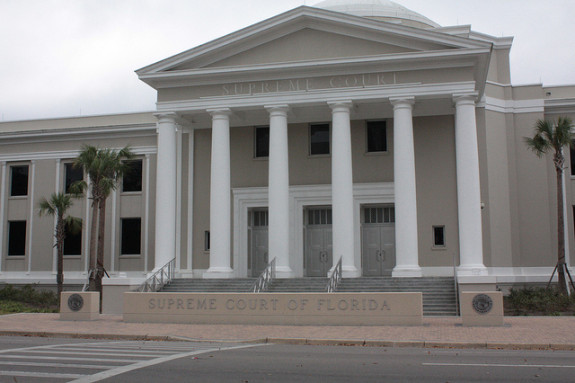
A proposed constitutional amendment could give the next governorthe ability to pack the Florida Supreme Court. (Photo via quite peculiar/Flickr)
By Ashley Lopez
Florida Center for Investigative Reporting
If a recently proposed amendment to Florida’s Constitution passes, the winner of the upcoming gubernatorial election will have the ability to pack the state Supreme Court.
This amendment would allow the next governor to make appointments to the Florida Supreme court even if the seats are vacated on inauguration day, which is the likely scenario several years from now.
According to Mary Ellen Klas of The Miami Herald/Tampa Bay Times Tallahassee bureau:
Under the proposal by Sen. Tom Lee, R-Brandon, the next governor could appoint the successors to three justices of the Florida Supreme Court who would have to retire on the same day the governor’s term ends, on Jan. 8, 2019. Justices are required to retire at age 70, but can continue to serve on the bench until the end of their six-year term.
Justices R. Fred Lewis, Barbara Pariente and Peggy Quince — the court’s liberal wing — will all turn 70 some time during the next governor’s term, and their six-year terms will all end on the same day as the new governor is inaugurated.
The state constitution is unclear about whether the incoming or outgoing governor should make the appointment when the vacancy occurs on inauguration day. The proposal is designed to put some certainty into the law by giving governors a “prospective appointment” as part of the state’s merit selection system used for appellate courts.
If voters approve Lee’s amendment in November, Gov. Rick Scott, if reelected, or his successor will have the power to appoint a majority of the seven-member court, a legacy that could last for decades.
Here’s how it would work: one of the last acts of the governor elected this November could be to name three new justices to replace the ones leaving the bench on inauguration day 2019. A fourth justice, James. E.C. Perry, will retire in January 2017 and Scott — or his successor — will name his replacement. If the new justices are young enough, they could remain in office for decades, or until they reach the mandatory retirement age of 70.
This isn’t the first time state legislators have angled to have a say in how the Florida Supreme Court gets its justices.
In 2012– among a slew of Legislature-pushed ballot amendments—lawmakers unsuccessfully tried to amend the state constitution to require that the state Senate sign off on justice appointments, which experts said would have politicized the state’s highest court.
The 2012 ballot measure would have also allowed the Legislature to repeal any court decision with only a majority, which is 50 percent plus one. Right now, the legislature needs a supermajority, a vote count that is much harder to achieve.
The Florida Supreme Court has been a source of frustration for many Republican leaders in the state Legislature, mostly because efforts to change state pension contracts and other right-leaning policy from lawmakers has been halted by the court.
Also in 2012, the state Republican Party led an effort to get three of the more liberal members of the court ousted from their positions. The party, along with right-wing groups funded by the likes of the Koch brothers, tried to oust Lewis, Pariente and Quince from the Florida Supreme Court during their merit retention votes. All three justices were appointed by a Democratic governor. Like the ballot measure, though, that merit retention fight failed.
While some Republican state officials, such as Chief Financial Officer Jeff Atwater, got behind the effort, not all Republicans thought it was a good idea.
The Herald/Times reports that there are conflicting opinions on this latest move, too.
The bill’s sponsor, however, told the Times/Herald the bill is ultimately an effort to avoid a “constitutional crisis” in the future.
